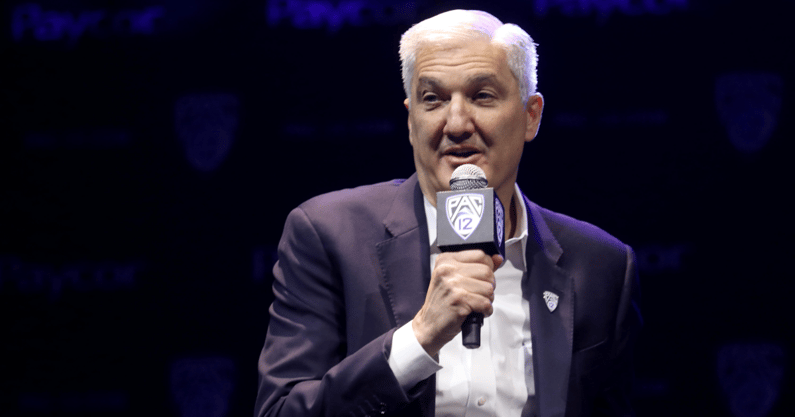Pac-12 officials explain how FBS conferences can address NIL without anti-trust issues

As the question of how to enforce rules and guidelines for NIL lingers, Pac-12 commissioner George Kliavkoff revealed the large role a potential anti-trust lawsuit has in the process for the NCAA.
At Pac-12 Media Days this week, Kliavkoff pointed to that as the main reason for the lack of enforcement of current NIL rules. He also called for the FBS conferences to come together and take a stand in the face of that reality.
“Well, anti-trust is the reason why the current NCAA rules are not being enforced,” the commissioner said. “The risk of anti-trust diminishes when you have a smaller number of conferences, smaller number of schools instituting rules and enforcing those rules. That’s why I’m calling for … the 10 [FBS] conferences to focus our attention as opposed to waiting for the NCAA.”
In June of 2021, the Supreme Court ruled that the NCAA restrictions on “education-related benefits” for college athletes violated antitrust law. That is what opened the door for NIL to take hold beginning last season, though there are few guidelines in place to stop schools from taking advantage of current rules.
Although the NCAA’s interim policy says to “avoid pay-for-play and improper inducements tied to choosing to attend a particular school,” less than a year into the NIL free-for-all era, pay-for-play schemes are the bread and butter of NIL collectives. That is one of the main concerns for Stanford athletic director Bernard Muir, who agreed with Kliavkoff’s statement regarding NIL and anti-trust.
“I would agree with that,” Muir said. “I think it’s important that we have some level of enforcement. Certainly we’re seeing that in the recruiting realm where schools and I should say boosters and friends of the institution are getting involved when they shouldn’t be. That’s not the essence of this. We are in favor of student-athletes earning revenue from their name, image and likeness.”
Although boosters aren’t allowed to be involved in recruiting under current rules, accusations of tampering have come up multiple times this offseason. One of the most prevalent examples was the transfer of Pittsburgh receiver Jordan Addison to USC. Before he did, reports surfaced about a potential NIL deal if he decided to head to USC to play for Lincoln Riley. That came out before Addison officially entered the portal, which is why Pitt coach Pat Narduzzi called Riley out regarding the situation.
Top 10
- 1New
Adou Thiero
Injury update
- 2
Charles Barkley
Advises Chad Baker-Mazara with Nick Saban quote
- 3Trending
Bracketology
Updated as Champ Week begins
- 4
ACC Controversy
Notre Dame wins on foul call
- 5Hot
Paul Finebaum
Predicts multiple ACC departures
Get the On3 Top 10 to your inbox every morning
By clicking "Subscribe to Newsletter", I agree to On3's Privacy Notice, Terms, and use of my personal information described therein.
But the transfer portal is far from the only place where this can happen. Kliavkoff also expressed his concern regarding boosters involvement with high school recruits. Earlier in the offseason, The Athletic reported an unnamed five-star recruit had an $8 million NIL deal waiting for them once they committed.
“The clear line for me should be that boosters should not be able to interact with high school students before they’ve committed,” Kliavkoff said. “Coaches should be able to say to a recruit that historically kids who have come here and played that position at that level have enjoyed this kind of NIL. But you can’t negotiate the NIL before the kid has committed. That would be a good bright-line rule that I think would be easier to implement.”
More on NIL and anti-trust
The NCAA will have a tough time putting the cat back in the bag after a year of unfettered deal-making. Ohio State athletic director Gene Smith believes litigation is essentially unavoidable. However, he and other program leaders are willing to take that risk.
“We had to make a business decision to say, ‘You know what? This is a line in the sand,’” Gene Smith told The Athletic. “There’s going to be risk with the position that we’re going to take. There always is with these types of things. We could get sued. But, for the betterment of the whole and all the student-athletes we serve, we’ve got to take that risk.”
“The moment they come to try to interfere with one of my clients’ deals — the next day is the moment they get hit with an antitrust lawsuit,” Mike Caspino, an attorney representing several NIL collective-backed athletes, told The Athletic. “They’re saying there’s a whole class of people (boosters) who can’t participate in the market for athletes’ NIL rights. That’d be like saying red-haired people can’t buy meat. That’s antitrust.”
On3’s Nikki Chavanelle contributed to this report